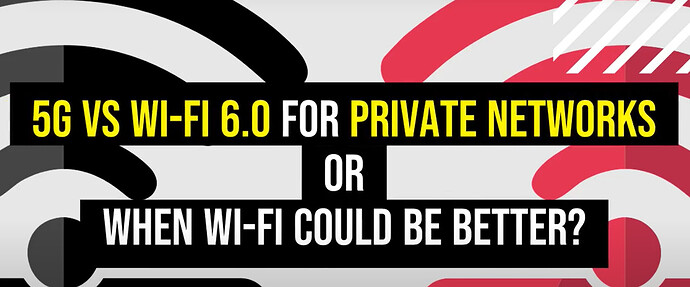Hello Experts.
In this video some advantages of Wi-Fi 6.0 that make it more suitable than 5G for private network deployments:
-
Higher Data Rates: Wi-Fi 6.0 offers significantly higher data rates compared to previous Wi-Fi standards, allowing for faster and more efficient data transfer. This is beneficial for bandwidth-intensive applications that require high-speed connectivity.
-
Lower Deployment Costs: Deploying a Wi-Fi network is generally more cost-effective than building a 5G infrastructure. Wi-Fi access points are typically cheaper and easier to install, making it a more budget-friendly option for private network deployments.
-
Device Compatibility: Wi-Fi is a widely adopted technology, and most devices today are equipped with Wi-Fi capabilities. This makes it easier to connect devices to a Wi-Fi network without the need for additional hardware or modifications.
-
Flexibility and Customization: Wi-Fi networks offer greater flexibility and customization options compared to cellular networks. Network administrators have more control over network settings, security protocols, and traffic management, allowing for tailored configurations based on specific requirements.
-
Seamless Roaming: Wi-Fi networks support seamless roaming, allowing devices to maintain connectivity while moving between access points. This is particularly useful in environments where mobility is essential, such as office buildings or warehouses.
-
Localized Coverage: Wi-Fi networks are typically designed for localized coverage within a specific area, making them ideal for private network deployments in confined spaces like offices, homes, or small businesses.
-
Lower Latency for Local Traffic: Wi-Fi networks provide lower latency for local traffic within the network, as data doesn’t need to travel through external cellular networks. This is advantageous for applications that rely on real-time communication or require quick response times.
-
Network Control: With a private Wi-Fi network, organizations have complete control over their network infrastructure, including security settings, access policies, and network management. This allows for more granular control and customization based on specific requirements.
-
Easier Integration with Existing Infrastructure: Wi-Fi networks can seamlessly integrate with existing IT infrastructure, making it easier to incorporate Wi-Fi connectivity into an organization’s existing network architecture. This simplifies deployment and reduces the need for significant infrastructure changes.
-
Dedicated Network: With a private Wi-Fi network, organizations have exclusive control over the network resources, bandwidth allocation, and security measures. This provides a dedicated network environment that can be customized to meet specific privacy and security requirements.
It’s important to consider that the suitability of Wi-Fi 6.0 or 5G for private network deployments depends on the specific use cases, requirements, and environment. Organizations should carefully evaluate their needs to determine the most appropriate technology for their private network deployment.
YouTube: ![]() 5G vs Wi-Fi 6.0 for private networks: when Wi-Fi could be better? - YouTube
5G vs Wi-Fi 6.0 for private networks: when Wi-Fi could be better? - YouTube
